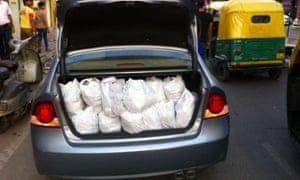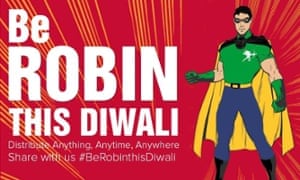Last August, a group of six young Indians took to the streets of Delhi with one simple aim: to feed the homeless. Overnight, they drove to restaurants, collected unsold food, re-packaged it and gave it to around 100 people sleeping rough in the capital.
For 27-year-old Neel Ghose, it was a wake-up call. Friends, colleagues and strangers soon joined them on drives and their numbers began to swell. In less than a few months, a nationwide volunteer movement known as the Robin Hood Army (RHA) had emerged, on a mission to curb food waste and stamp out hunger.
Founders Ghose and Anand Sinha, also 27, were inspired by Refood International, an organisation based in Portugal. “Using a hyperlocal model, they collect excess food and give it to those who need it. But every community has their own Refood chapter,” explains Ghose. “I realised it was something that can be very easily done in India, where the need would be much more.”
The movement gained huge momentum after the launch of its social media campaign, and now boasts a 500-strong volunteer base spread out across 13 cities, including Hyderabad, Mumbai and Kolkata. In April, the group also began operations in neighbouring Pakistan, where volunteer groups sprang up in Karachi and Lahore.
 Volunteers get ready to distribute food packages throughout the city. Photograph: Robin Hood Army
Volunteers get ready to distribute food packages throughout the city. Photograph: Robin Hood Army
“Our Facebook page has helped us get in touch with restaurants and our posts became a form of accountability,” says Sarah Afridi, a volunteer who helped set up the group in Pakistan. Ghose agrees: “We realised that we would be much more legitimate if we showed restaurants pictures of what we were doing. That’s when things took a huge leap forward.”
The Robin Hood Army’s ideology revolves around decentralisation. Small teams, mostly young professionals, become responsible for specific areas; they scout for local restaurants, convince them to donate surplus food, identify clusters of people in need – such as the homeless and orphanages – and carry out weekly distributions.
“Anand and I don’t have to be in cities physically to set up our presence,” says Ghose. “We simply guide people on how to form communities for the RHA.” Sinha adds: “What’s happening at a grassroots level is completely driven by the locals.”
In Delhi and the National Capital Region alone, some 30 restaurants have been involved with the project, sometimes not only offering leftover food but cooking fresh meals for distribution.
Lawyer Suvarna Mandal, 26, and head of RHA’s social media Aarushi Batra, 24, both volunteer in the city and have distributed everything from biryani and dhal to sweet treats like cakes, brownies and biscuits. While they may not always have the healthiest foods to hand out, Mandal says: “We don’t look into the nutritional aspects per se, we just try to fill their stomachs.”
“Some restaurant owners even join them on drives,” Ghose explains later. “In a way, they’re not just helping the Robin Hood Army, they are the Robin Hood Army.”
During the Indian wedding season, which takes place between November and January, RHA groups also worked with caterers to make sure large amounts of uneaten food would be picked up, no matter how late at night. “It’s no secret that weddings in India are huge,” Batra tells me. “In Hyderabad, four of our volunteers fed around 970 people just with excess food from one wedding.”
According to the Centre for Development Communication (CDC), an NGO in Jaipur, there are an estimated 7m weddings in India during the season. Yet nearly one-fifth of all prepared food is thrown away – a staggering £1.6bn in wastage.
Like the RHA, the CDC developed the Annakshetra initiative, which redistributes food leftover solely from weddings, festivals and other lavish social gatherings. It was set up in 2010 after founder Dr Vivek Agrawal saw children salvaging food from piles of discarded food dumped outside a town marriage hall: “The way food is eaten and wasted in weddings is an eye-opener for everybody,” he says.
 An advert on Robin Hood Army’s Facebook page encourages more volunteers to join the movement. Photograph: Robin Hood Army
An advert on Robin Hood Army’s Facebook page encourages more volunteers to join the movement. Photograph: Robin Hood Army
Ravi Dhingra, who helps run the foundation, says networks of volunteers collect excess food directly from events, store it in fridges overnight and check it is fit for consumption before organising handouts in the morning. In 2012, up to 10,000 were fed solely on leftovers from 16 weddings held on Akshaya Tritiya, a day considered auspicious for Hindus to tie the knot.
When asked about the RHA’s work, Dhingra tells me: “Pioneering efforts like [theirs] demonstrate enormous opportunities to reduce food waste — and enhance food security worldwide.”
Yet Dhingra and Ghose also believe that while their initiatives are making a difference, there has to be more sustainable ways to tackle widespread food poverty in south Asia. “Food donations are not the solution to food wastage or poverty, [but] food redistribution can help alleviate [its] impacts,” Dhingra says.
According to the most recent Global Hunger Index, while India no longer ranks second-to-last for having the world’s most underweight children, its overall hunger status is still classified as “serious”. Meanwhile, it remains home to a quarter of the world’s undernourished people yet it wastes more than £4bn worth of fruit and vegetables a year. Ghose is well aware of the scale of the problem: “Right now, we feed around 5,000 people a week ... In the bigger scheme of things, that’s still nothing.”
But with plans to expand into more areas and partnerships with university students in the pipeline, the RHA’s influence is poised to grow across the continent.
“We’re in an exciting time where more people want to bridge gaps in society,” Sinha says. “Through social media and through our volunteers, we can channel this energy and create something stronger out of this. The Robin Hood Army is just the beginning.”
Join our community of development professionals and humanitarians.
Follow@GuardianGDP on Twitter.